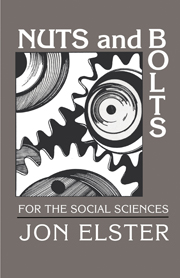Book contents
- Frontmatter
- Contents
- Preface and Acknowledgments
- Part One Introduction
- Part Two Human Action
- II Desires and Opportunities
- III Rational Choice
- IV When Rationality Fails
- V Myopia and Foresight
- VI Selfishness and Altruism
- VII Emotions
- VIII Natural and Social Selection
- IX Reinforcement
- Part Three Interaction
- Bibliographical Essay
- Index
IX - Reinforcement
Published online by Cambridge University Press: 05 June 2012
- Frontmatter
- Contents
- Preface and Acknowledgments
- Part One Introduction
- Part Two Human Action
- II Desires and Opportunities
- III Rational Choice
- IV When Rationality Fails
- V Myopia and Foresight
- VI Selfishness and Altruism
- VII Emotions
- VIII Natural and Social Selection
- IX Reinforcement
- Part Three Interaction
- Bibliographical Essay
- Index
Summary
AT the end of chapter II, I mentioned how a child might develop nervous symptoms as a result of her parents' quarreling. I also discussed the implausible idea that she might unconsciously have adopted these symptoms in order to make her parents stop quarreling. But there is another possibility. Suppose that the parents do indeed stop quarreling when they see that they are making the child unhappy. From the child's perspective, she is rewarded for her symptoms. Although the symptoms arose independently of any intended effect on the behavior of the parents, their actual effect tends to reinforce them. The function of the symptoms, on this account, is to keep the parents from quarreling.
This particular example of reinforcement may or may not be a plausible one, but there are plenty of cases in which this mechanism is the best explanation of behavior. We meet people more or less at random and cultivate as friends those whose company we like. We try out cooking recipes more or less at random and retain those that happen to please our spouse. Often, we do not do things for pleasure, but because they give us pleasure. In these cases a certain form of behavior has valuable or pleasurable consequences, and our perception or registration of that fact strengthens or reinforces our tendency to engage in it.
- Type
- Chapter
- Information
- Nuts and Bolts for the Social Sciences , pp. 82 - 88Publisher: Cambridge University PressPrint publication year: 1989



